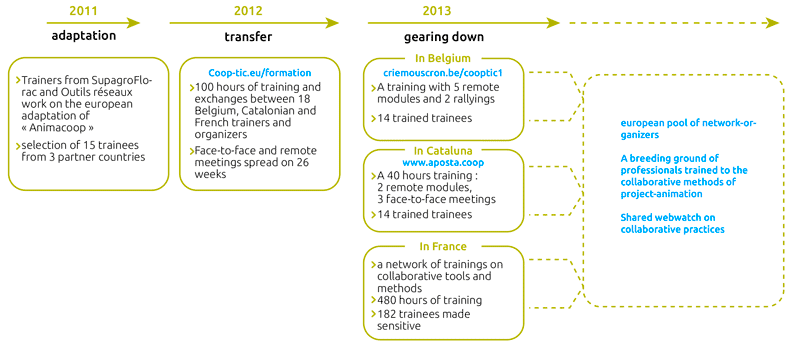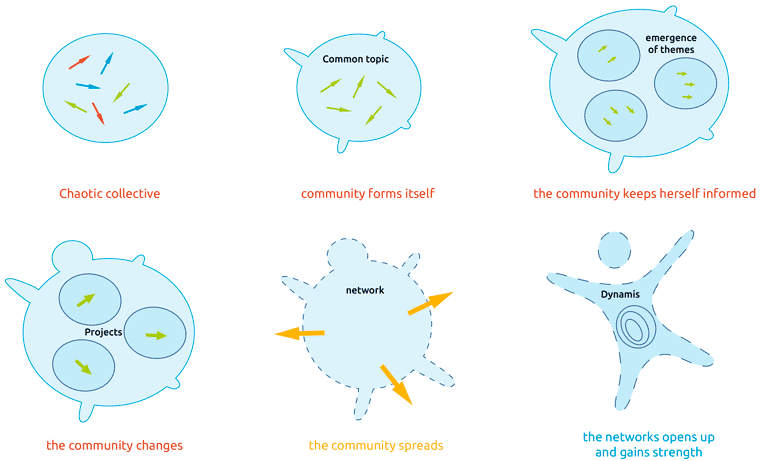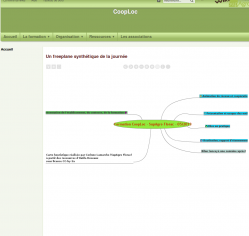Introducing the Cooptic project
Cooptic is an initiative for innovation transfer funded by the European Commission within the framework of the Leonardo da Vinci project. Four partners specializing in innovative teaching methods - Suprago Florac and Outils-RĂ©seaux (Montpellier), the Cooperation School Aposta from Catalonia and the Regional Centre for Environmental Initiatives (CRIE Mouscron) from Wallonia – joined forces to work on adapting a training tool for collaborative project facilitators.
During the Cooptic project, fifteen people from three countries (Belgium, France and Spain) received training to become trainers of cooperative project and network facilitators, in their respective circles.
Cooptic today has 60 network facilitators forming a real pool in three European countries. This network developed over the course of three years:

Introducing the team of partners
The Cooptic programme linked four structures:


The ‘reference’ association in France for networking. Its main mission is to start and accompany cooperative networks and practices using methodological tools and the Internet. In 2010, Outils-RĂ©seaux created the Animacoop training tool for facilitators and professionals working in the fields of cooperation and network facilitation. This Animacoop tool was a part of the European Cooptic project.


These partners brought together the skills of several institutions, universities, researchers, and local actors and groups engaging in participatory development who actively participated in drafting the e-book you have in your hands.
Introduction to the learning tool
The Cooptic learning tool is based on educational principles that aim to accompany trainees along the path to autonomy and building their capacity to carry out informed actions. Trainees are the main focus of the teaching tool. These principles lead to the choice of teaching methods and resources that are articulated around three ideas: the crosscutting nature of knowledge and collaborative skills to be learnt; a link to the professional projects of trainees; and the use of the possibilities offered by digital tools to innovate in teaching practices.What can be learnt with the Cooptic training?
The training contents favour the development of operational skills linked to the facilitation of cooperative projects: managing information, co-producing resources, starting network dynamics, group facilitation…These contents are structured around 12 key concepts and 12 crosscutting collaborative skills:

These collaborative skills are dealt with in parallel at three different levels:
- at an individual level, training develops the engagement of a person in a collaborative project,
- at a group level, training deals with understanding group dynamics, networks, groups and skills to manage a group,
- a third level relating to the environment refers to openness factors and communication “outside” the network.
How is the learning done?
During a training period of 14 weeks, trainees work remotely and on-site following a progression in three parallel itineraries:- Individual itinerary:

- Creation of the network: the group is established, a “group of individuals” becomes aware that it is a learning group.
- The network becomes informed: exchanges on the projects lead to a set of common experiences and problems.
- The network is transformed: individual and collective events are created in small-group collaborative work.
- Network outreach: spreading the outcomes of the cooperation works outside the community brings value to it.
- Network consolidation: this allows for an assessment and a reflexion on how to maintain the dynamics alive and how to open up to others.
- Collective trainee itinerary :

- Project itinerary :
A pedagogy impacted by new technologies
A training ecosystem:A methodology to move from “network facilitators” to “trainers of network facilitators”
A combination of on-site and distance exchanges using Internet-based tools
Using collaborative tools and methods during the training process.
Moments to exchange practices
Individual work on the trainees’ collaborative projects
Co-generation of knowledge: pedagogical training plans.
The Cooptic ebook
The ebook that you are handling contains the resources used during the CoopTic training session. Some were written specifically for the ebook because the contents were presented orally during training. This book is a state of our knowledge in the field of cooperation and collaboration at the time of writing in late 2013. But this is an area that is just beginning to be studied and we continue to experiment, to imagine, to try, to dream ... To make it short, even if the publication of this ebook is the outcome of the European project Leonardo CoopTic, this is not the end but just the bases of our future projects: a resource center on collaboration? A MOOC? Or perhaps something that does not exist yet!Enjoy your reading and your "small irreversible cooperation experiences" to come!
They took part in the adventure !
Coordination :
Hélène Laxenaire
Authors :
Gatien Bataille
Jean-Michel Cornu
Antoine Delarue
FNAMI LR
Mathilde Guiné
Claire Herrgott
Emilie Hullo
Corinne Lamarche
Hélène Laxenaire
Heather Marsh
Laurent Marseault
Daniel Mathieu
Outils-réseaux
Jordi Picart i Barrot
Manon Pierrel
Frédéric Renier
Violette Roche
Elzbieta Sanojca
SupAgro Florac
Vincent Tardieu
Laurent TĂ©zenas
Françoise Viala
and the Animacoop trainees.
Drawings :
Eric Grelet
Conception of routes
Claire d'Hauteville
Hélène Laxenaire
Elzbieta Sanojca
Translation in French :
Collaborative translation by members of the group AnimFr (article about stimergy)
Translation in English :
Koinos
Suzy Lewis-Vialar
Abdel Guerdane
Translation in Catalan :
Koinos
Jordi Picart i Barrot
Proofreading (of the French part) :
Caroline Seguin
Standardization of texts :
Cathy Azema
Gatien Bataille
David Delon
Corinne Lamarche
Hélène Laxenaire
Christian Resche
Cécile Trédaniel
Development:
Florian Schmitt
Graphic standards :
Imago design
Settlement and monitoring of the Leonardo project
Guy LevĂŞque
Cathy Azema
Martine Pedulla
Stéphanie Guinard
This work was achieved within the framework of a project of transfer of innovation (TOI) funded by the European Union through the Leonardo Da Vinci program.
All the contents (texts, images, videos) are under Creative Commons BY-SA 3.0 FR license. This means that you can freely distribute, modify and use them in a commercial context. You have two obligations: quote the original authors and the content that you create from ours should be shared in the same conditions under CC-BY-SA .
